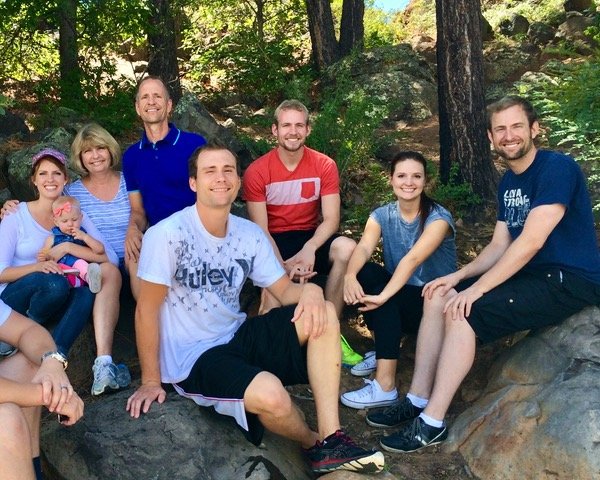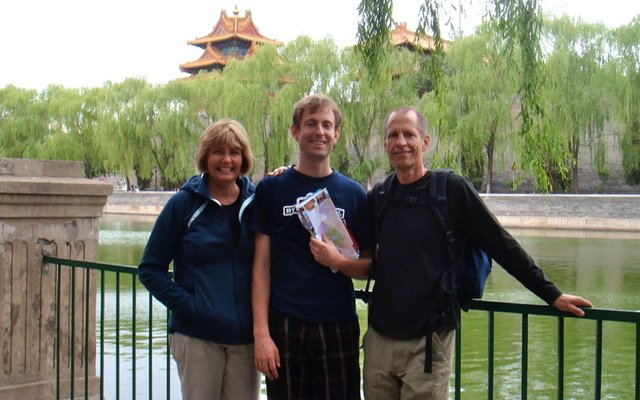Bryce Cook is a name many in this space may recognize after having stumbled upon his 2017 landmark work, which can be found at mormonlgbtquestions.com. His comprehensive essay impressively details the history and evolution of LGBT policies in the LDS church and presents the rationale for a more inclusive path forward. His personal experience, along with that of his wife Sara, as the parents of not one but two gay sons, only lends to the family’s credibility on the topic.
Bryce and Sara are founding members of ALL (Arizona LDS LGBT) Friends and Family and co-directors of the annual “ALL Are Alike Unto God” conference held every April in Mesa, AZ, that has before included guest speakers such as Steve and Barb Young, Terryl and Fiona Givens, and Richard and Claudia Bushman. But when Bryce considers the parents they were two decades ago, the parents who were stunned in disbelief at their oldest son’s admission to them that he was gay, and sadly acknowledges that up to that point he was “homophobic,“ his story provides hope that all have the potential to evolve on this issue.
“Mom and Dad, I know this will come as a shock to you, but I am same-sex attracted,” were the words that first launched the Cooks on their journey. Penned in a letter by their oldest son, Trevor, who was a freshman at BYU in Provo at the time, Bryce and Sara were completely stunned. Bryce thought, “How could this be? We were a faithful Mormon family, we had regular family prayer and scripture study, we had a very loving relationship with all our six children. And how could this happen to Trevor, a young man as honest, upright and moral as any young man I knew? It just wasn’t possible!”
But as he kept reading, Bryce saw the great turmoil his son had endured for years—feelings of guilt, self-loathing, failure and shame. Bryce’s mind then clouded with the painful reality that their son had not felt he could trust his parents with this information sooner. “He wanted to bear the burden alone, to spare us the grief.” Trevor had been afraid to admit he was a “failure” as a son, to acknowledge he was “one of those awful gays” he had heard his father reference. Bryce admits that until that moment, he’d held very un-Christlike views toward gay people and had likely contributed to the silent agony his son had suffered for so long. Bryce reflects, “By the grace of God, he had not been driven to suicide, as too many gay LDS youth have.”
While the Cooks were initially shocked and saddened by their son’s news, they let him know that no matter what, they loved him. Bryce confesses that at the time, they secretly held the hope that somehow, some way, he might be able to change. “The change, however, occurred in us.” An immediate change was the Cooks’ attitudes about gay people, thanks to their deep dive study into scientific research, evolving statements by church leaders, and the numerous experiences of LDS gay men and women. Their conclusions were threefold: 1) Being gay is not a choice. 2) Sexual orientation doesn’t change. And 3) Being gay is not just about sex—any more than being heterosexual is just about sex.
As the Cooks became more familiar with their newfound knowledge, they became more comfortable with who Trevor was, and no longer felt a need to hope for things that were not meant to be. They watched in wonder as Trevor chose to serve an honorable mission and finish his studies at BYU, and then continue to live a closeted life for 11 years before he opened up to anyone outside of his parents. During that time, Trevor watched as countless roommates loved life, dating, and making out with girls while he silently struggled to understand their heteronormative affections, knowing it wouldn’t be fair to force a relationship with a woman. On a trip to China to visit Trevor where he was working at the time, Bryce and Sara listened as their son said, “Mom, Dad, I want the same thing you two have—a companion, love, a family. I want that with someone who I can love, and that’s what I intend to do.” While they expressed their support, on their nightly couple walks, Bryce and Sara continued to ruminate on the “why us? Why our family?”—recognizing those thoughts now as just what their culture had taught.
Finally, at the age of 26, Trevor felt ready to share his news with his siblings and extended family. They all gathered together at the appointed time, wondering what it was that Trevor wanted to tell them, and in such a formal way. Sara remembers noticing that their youngest son, Tanner (a recently returned missionary who was attending BYU Provo and who joined the gathering via Facetime), had a “deer in the headlights” look upon hearing Trevor’s big announcement. Within a few weeks, Tanner told his parents that he, too, was gay and only had the courage to tell them after seeing the family’s positive response to Trevor’s announcement. When asked if Trevor and Tanner have a special connection, Bryce says that actually, all six of their children (who range from ages 32-38 and include Carly, Lindsay, Tyler, and Kristen, as well as several in-laws and seven grandchildren) share a close bond. Most of the Cook kids live near their parents and still gather for weekly Sunday dinners, where Bryce does most of the cooking. The Cooks are eager to have their family grow with two new official members. Trevor is marrying his partner of eight years, Ben, this November, and Kristen is marrying her longtime boyfriend in Cancun next year. Tanner is working as a physician’s assistant.
After Trevor opened up to his family, and soon thereafter, to his YSA ward, Bryce and Sara, initially wanted to keep this personal family information on the down low—especially in their ward. But Bryce could not ignore the persistent, strong impression that they must use their voice and the knowledge they’d gained to help those in their church who didn’t have a voice and who were facing a similar situation. Frustrated with the lack of resources they’d been able to find, Bryce began to research and compile all he could. The couple did a big Facebook post in 2011 in which they “came out” as the parents of a gay son. They helped start the ALL Arizona support group, they attended LGBTQ conferences, worked for anti-discrimination legislation, and came to know and love hundreds of LGBTQ people both in and out of the church. After being immersed in this world for several years, Bryce kept thinking someone needed to write a thorough treatise, from an LDS perspective, of all the arguments for inclusion that could be made. He kept hoping and expecting that someone would do it, but as time kept passing without anything emerging, he decided to take on the task himself. And with that decision, a creative muse showed up that guided and inspired his thoughts and writing over the course of a year as he worked an hour or two each evening until he completed his work in 2017.
Before making the essay public, Bryce sent drafts to various LGBTQ friends and church leaders he knew to obtain their feedback. Although he believed the essay took a respectful and even-handed tone with respect to the church, he was concerned that some church leaders still might find it critical, and thus faced a possible risk of church discipline. However, the initial feedback was uniformly positive, with one progressive stake presidency member telling him, “We’ve been waiting for something like this!” The essay went live on the website in March 2017 and was also published in the summer 2017 edition of Dialogue, a Journal of Mormon Thought. The website and essay garnered lots of attention and positive feedback, with Bryce being asked for interviews on a number of Mormon-themed podcasts. But in addition to the positive responses, he learned that the essay had also come to the attention of the church’s highest leaders, some of whom were displeased with it and thought it required an opposing response. Bryce couldn’t help but wonder whether the October 2017 general conference talk of a certain apostle (who spoke pointedly on the family proclamation) was directed his way.
Over their many years in the church, the Cooks had served in most of their ward’s leadership positions and were looked up to as strong, faithful members. But as they continued to speak out on behalf of their LGBTQ family and friends, they began to sense an uneasiness from some of their fellow members (even though the Cooks were never confrontational or disrespectful of the church or those members). On one occasion, after Sara opened up to her visiting teaching companion (a member of the primary presidency and the wife of a stake presidency member), sharing her heartfelt concerns and questions about how church leadership was dealing with our LGBTQ members, Sara was quickly released from her primary teacher calling without any explanation. From other experiences like this, the Cooks began to feel more and more like they didn’t fit in, which ultimately led to their deciding to move out of their very politically and religiously conservative ward to a less-LDS-concentrated area with a little more diversity.
Like many families in their situation, the Cooks’ children have also had to grapple with their relationship with the church, with five of the six deciding to no longer participate. While Bryce and Sara’s relationship to the institutional church has evolved over the years (particularly after the 2015 exclusion policy), they enjoy their local ward and serving in Primary (where he’s the pianist and she’s a teacher).
As a forensic accountant who testifies as an expert witness on financial and economic issues, Bryce is grateful for what he’s learned from his other role as an advocate for LGBTQ rights and inclusion, and most especially for the many friends he and Sara have come to know and love. Although six years have passed since he published his groundbreaking essay, it still attracts new viewers every month and continues to be widely shared. When asked if he thinks the church might change its position on LGBTQ issues in the future, Bryce can only offer a “Who knows?” but says, “You’d think if the church is going to survive, both in terms of attracting new members and in retaining the younger generations, it will have to change at some point. Where would the church be now if there was no 1978 revelation that overturned the race-based ban on priesthood and temple? It would probably be a strange little sect that no one paid any attention to. If it wants to grow and remain relevant in the world, I think it will have to change with respect to both its position on LGBTQ issues and on giving women an equal voice in leadership.” But he doesn’t think anything will happen under the church’s current senior leadership.
Given where Bryce and Sara are in their lives with respect to the institutional church, they are no longer bothered by what happens in Salt Lake, except to the extent it hurts their fellow LGBTQ members and their families. For that reason, they still try to share their voice and do what they can to bring about positive change among the members. Despite the difficulties and challenges they faced in their early years as orthodox members with gay kids, they say they wouldn’t change a thing about how their life has unfolded. Bryce says their hearts and minds have expanded far beyond what would have ever been possible had they not embarked on this journey.






















